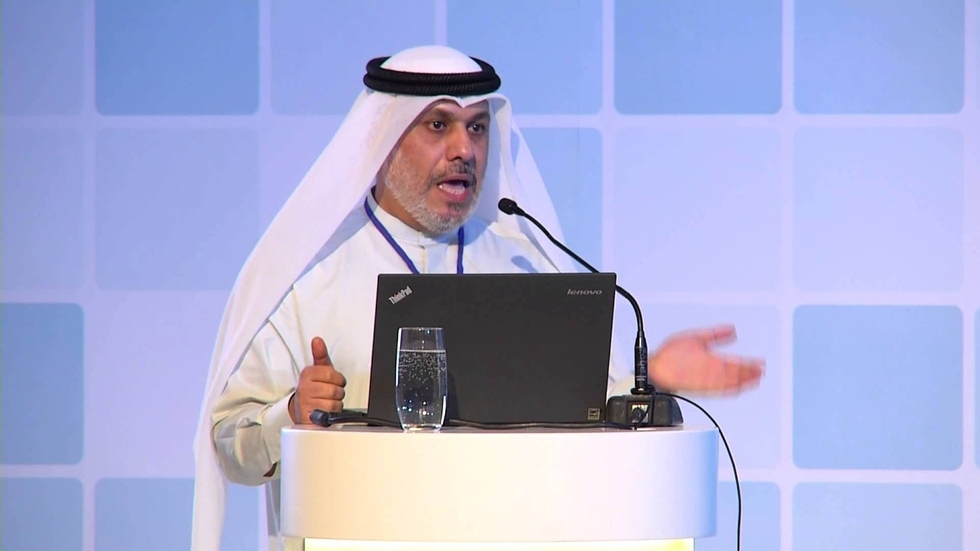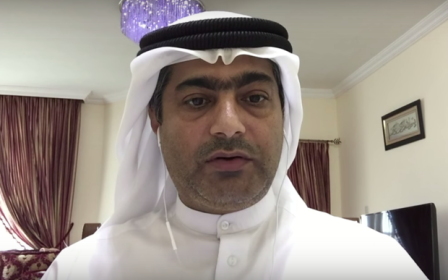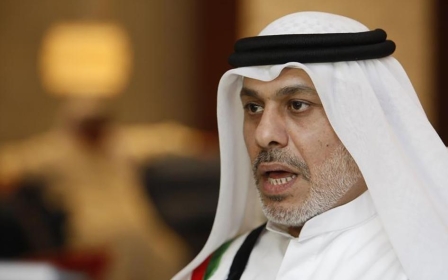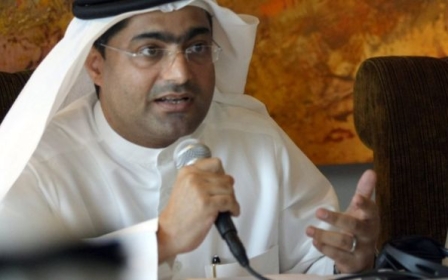10 years for a tweet: UAE jails academic for criticising Egypt

The United Arab Emirates has jailed a prominent economist and human rights defender for 10 years over tweets that criticised Egypt, a key ally of the Gulf country.
Nasser Bin Ghaith was sentenced at the Federal Appeal Court in Abu Dhabi on Wednesday for "communicating with secret organisations" and "offensive online posts", the Emirati state news agency reported.
Ghaith told the court he had been beaten and deprived of sleep for up to a week at a time by prison guards
The court did not specify which social media posts the charge related to or what they said. The authorities said he had published “photos and articles that are offensive to the state’s symbols and values, its internal and foreign policies and its relations with an Arab state,” which is understood to refer to Egypt.
Ghaith is an Emirati economist who has lectured at the Abu Dhabi campus of the Paris-based Sorbonne University. He also worked as an economic and legal consultant to the UAE army.
"By imposing this ludicrous sentence in response to his peaceful tweets, the authorities have left no room for doubt: those who dare to speak their minds freely in the UAE today risk grave punishment," declared Lynn Maalouf, deputy director for research at Amnesty International.
Amnesty called Ghaith "a prisoner of conscience, imprisoned for the peaceful expression of his conscientiously held beliefs."
The human rights monitor said that "he should never have been forced to spend a single minute behind bars, let alone 10 years."
Amnesty called him another victim "of the UAE’s repressive crackdown on dissent, which also saw the prominent human rights activist Ahmed Mansoor arrested last week".
Mansoor was arrested by UAE authorities in March for online activity. Last year he won the Martin Ennals Award for Human Rights Defenders for his reporting on torture and unjust detentions in the Gulf state.
Translation: My critical stance towards the regime in Egypt does not mean I do not want the country to progress and develop. On the contrary, it is because the regime is short-lived, and Egypt will remain. Just to clarify
Ghaith was critical of Egypt's crackdown on political opponents and of the UAE's support for President Abdel Fattah al-Sisi's government. Cairo and Abu Dhabi are key allies and joined forces in military operations against the Islamic State group in Libya.
Ghaith posted on Twitter a picture of a burnt building in Cairo on 14 August 2015, the anniversary of the killing of hundreds of protesters in Rabaa square.
Translation: On this day, worshippers were murdered and a mosque was burnt down by the Mongols of this age…It happened in Egypt
He was arrested four days later, on 18 August 2015, by 13 plainclothes security officers and taken to his home in Dubai, which was searched, before being held at an unknown location where he has remained since, according to an Emirati activist who had spoken to MEE on condition of anonymity.
The activist said that Ghaith appeared in a closed court session in April last year at the State Security Chamber of the Federal Supreme Court in Abu Dhabi, where he was accused of violating the UAE’s cybercrime and counter-terrorism laws.
The court appearance was the first time Ghaith’s family had seen him since his arrest eight months earlier, according to the activist, who claimed that the legal process is “failing to meet international standards”.
“He remains in secret detention in an unknown location,” he said, adding that Ghaith told the court he had been beaten and deprived of sleep for up to a week at a time by prison guards.
When Ghaith made the allegations of torture in court, the judge, according to the activist, “got angry” and said: “How do you know you are in secret detention?”
“Nasser has been denied access to his lawyer. He was only able to see his lawyer for the first time in court, and even then, he was not allowed to talk to him or meet him privately,” the Emirati rights activist had told MEE last year.
Ghaith had previously been detained for his political activism. He was imprisoned between April and November 2011 on charges of “insulting” UAE President Khalifa bin Zayed al-Nahyan, Vice President and ruler of Dubai Mohammed bin Rashid al-Maktoum, and Abu Dhabi Crown Prince Mohammed bin Zayed al-Nahyan.
He was jailed along with four other activists, who were collectively known as the UAE Five, for signing an online petition that called for the country’s Federal National Council to be wholly elected by universal suffrage and to have full legislative powers.
Half of the council, which plays a purely advisory role in legislative matters, is currently elected by 12 percent of the population.
New MEE newsletter: Jerusalem Dispatch
Sign up to get the latest insights and analysis on Israel-Palestine, alongside Turkey Unpacked and other MEE newsletters
Middle East Eye delivers independent and unrivalled coverage and analysis of the Middle East, North Africa and beyond. To learn more about republishing this content and the associated fees, please fill out this form. More about MEE can be found here.




